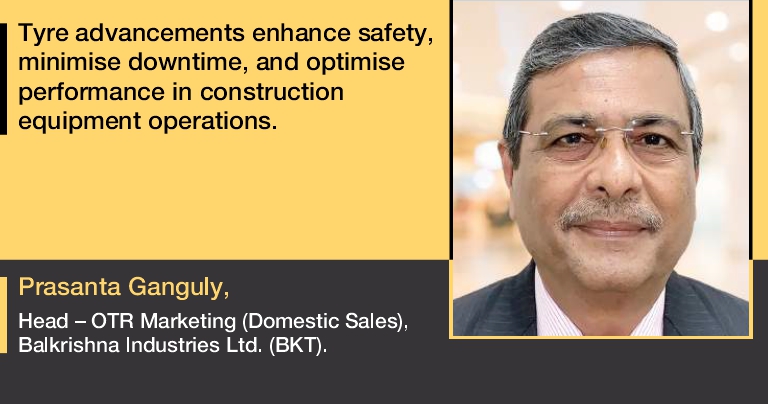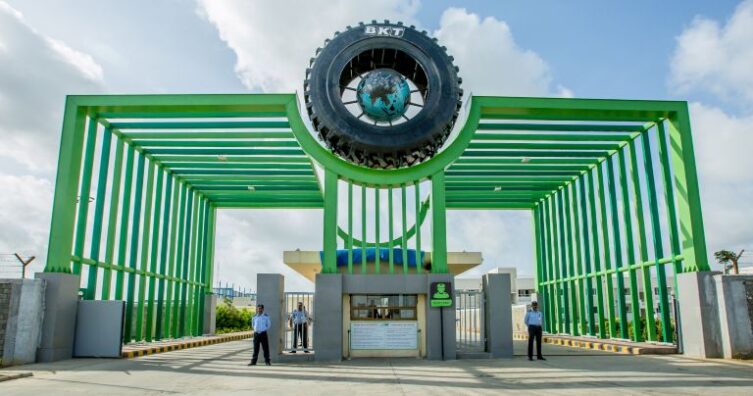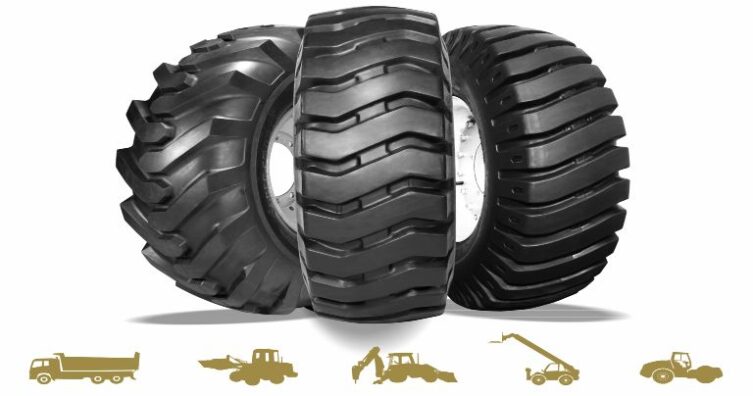Construction equipment tires forge ahead with unyielding strength and innovation
By Edit Team | August 7, 2023 1:01 pm SHARE

Prasanta Ganguly, Head of OTR Marketing at BKT, highlights how high-quality tires withstand extreme conditions, ensuring safe and efficient construction equipment operations.
How do tires for construction equipment withstand extreme working conditions and deliver exceptional performance in challenging terrains?
Tires for construction equipment are crafted with high-quality materials like steel cord, nylon, and specialised rubber compounds for exceptional strength and durability. The multiple layers of steel belts and reinforced sidewalls enhance the tire’s capabilities to withstand cuts, punctures, and impacts from external damages.
Tires manufactured for the cement quarry need to exhibit excellent heat & cut resistance, and their sidewalls withstand impacts; hence these tires are made using tailored rubber compounds that help to balance flexibility and toughness, absorbing shocks on rough terrains. For example: – the Rock Grip and XL Grip Ultra for the mining tipper equipment are made with terrain-specific tread compounds that optimise performance. These cutting-edge features make tires essential for safe, reliable, and efficient construction equipment operation.

What are the key considerations in selecting the right tires for different types of construction equipment?
Selecting the right tires for construction equipment entails considering key factors. Understanding the equipment type and application is crucial, as each machine has distinct tire requirements based on weight, size, and operational conditions. Adequate load capacity is essential to prevent premature wear and tire failures. Tread design significantly optimises different patterns for specific terrains like rock, gravel, mud, or sand, enhancing traction and stability. Considering tire lifespan is vital, as durability affects operating costs. Evaluating the expected lifespan of equipment usage aids in cost-effective choices. Tire compounds tailored for specific purposes should be chosen, prioritising wear resistance, traction, or heat resistance based on operating conditions. These considerations empower construction equipment operators and fleet managers to make informed decisions, ensuring efficient and safe operations while reducing downtime and maintenance costs.
What are the key factors driving the demand for tires in the construction sector, and how do they address the specific challenges of heavy-duty applications?
The demand for tires in the construction sector is driven by various factors, including India’s rapid infrastructure development, urbanisation, and government initiatives. Tires are crucial for heavy-duty construction equipment navigating challenging terrains. They address the challenges with their durable construction, superior traction, and resistance to cuts and heat, enabling safe and efficient operations on construction sites and in mining areas. Their versatility, available in various sizes and configurations, suits diverse construction applications. Tires’ robustness, advanced tread patterns, and heat-resistant compounds ensure they handle heavy loads and resist punctures. Overall, the demand for tires is fuelled by India’s growing construction and mining industries, emphasising the need for reliable and performance-driven tires to meet industry demands.

How do advancements in tire technology enhance safety and minimise downtime in construction equipment operations?
Advancements in tire technology have significantly enhanced safety and minimised downtime in construction equipment operations. Modern tires are engineered with special compounds to increase durability and resilience to withstand rough terrains, reducing the risk of failures and punctures. Advanced tire compounds ensure heat and cut resistance, preventing blowouts during extended use. Improved tread design optimises traction and grip, reducing slippage in challenging terrains. Integration of Tire Pressure Monitoring Systems (TPMS) enables real-time pressure monitoring, preventing potential tire issues. Predictive maintenance capabilities through sensors and telematics allow proactive maintenance, reducing unexpected tire failures. Furthermore, fuel-efficient tires with reduced rolling resistance contribute to cost savings and increased productivity. These innovations collectively create a safer and more efficient working environment for construction equipment operators.
What are the future advancements and trends in tire development for CE, optimising performance and sustainability?
In the future, tire development for construction equipment is expected to witness significant advancements and trends. Manufacturers will focus on improving tire durability and wear resistance through innovative materials and process techniques, ultimately extending tire lifespan and reducing maintenance costs. Integrating sensors and smart technologies will enable real-time monitoring of tire conditions, temperature, and pressure, optimising tire usage and enhancing safety. Additionally, there will be a drive towards higher load-carrying capacities, improved fuel efficiency, and tires specifically designed for autonomous and semi-autonomous construction equipment. Sustainable materials and manufacturing practices will be prioritised to align with environmental concerns. Noise reduction, tire-to-vehicle connectivity, and continuous industry developments will shape the future of tires for construction equipment.
Cookie Consent
We use cookies to personalize your experience. By continuing to visit this website you agree to our Terms & Conditions, Privacy Policy and Cookie Policy.




















